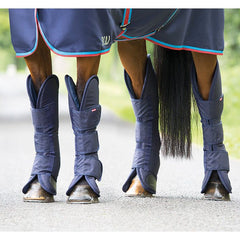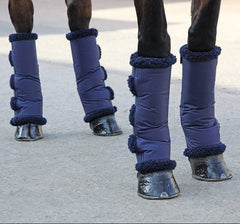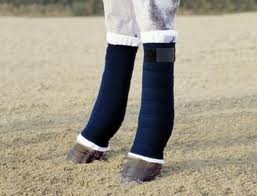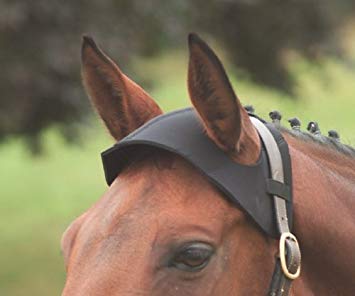Travelling attire for horses
What your horse should wear when travelling is a widely debated topic with a range of answers. We have put together some tips to help you make an educated decision and ensure that your horse arrives from A to B safely and happily!
Travel Boots
There are a range of travel boots on the market, ranging from shorter boots through to the longer boots referred to as ‘trucking boots’. Ideally, we want to ensure our horses are protected from any knocks or scrapes from the knee/hock to the coronet band.
- Trucking boots are a great option to ensure their legs are fully protected. They can, however, be quite awkward and some horses will dislike wearing them, especially on their hinds.
- Floating boots, that go from under the knee to the coronet band, are the next best option for protection. They may still dislike them being on their hind legs, so be careful when they walk off for the first time.


Trucking boots provide more protection than floating boots.
Boots are a great option for travelling, but they can still slip. It is important they are checked regularly throughout transit.
Bandages
Bandages are another option for travel, and it is recommended that they are used with large bandage pads underneath.
- Unlike the travel boots that protect a large portion of the horse's leg, bandages using the bandage pads can only protect the horse from under the knee to just under the fetlock.
- They can be used under floating boots for particularly bad travellers.
- Some horses prefer the feel of bandages compared to boots.
- Be careful when bandaging that pressure is applied evenly, and the bandages are not too firmly tightened. When used incorrectly, bandages can cause serious damage. Ensure you know how to use them properly, or get someone to help you!
- There are some equine ‘socks’ available that can be used under the bandage pads to reduce swelling and increase circulation, great for long travel!
Like boots, bandages can undo and unravel. Make sure you check them regularly through your float camera, or by stopping.

Overreach boots
Overreach boots are most commonly used for horses that have a tendency to move around or scramble.
- Overreach boots provide protection under the forelock and over the hoof, and are often used in conjunction with bandages or short float boots.
- They can prevent overreach cuts, or shoe twisting/pulling if your horse tends to scramble.
Halter
- Rope halters are great for loading, but they are not recommended during transit as should your horse slip or fall, the halter needs to be quickly removed.
- A leather halter, or normal halter, are preferable for travel as they can be cut or undone in the case of an accident, they also break under extreme pressure.
- Additional padding, including a pole guard or fleece can be used if your horse has a tendency to move around or rear. If you’re worried they will knock their head, especially if they can be funny to load/unload, a pole guard is recommended.

Rugs
Rugging is a long-debated topic when it comes to travelling. It is important you monitor the outside temperature during travel, and check often that your horse is not over-heating. There is a lot of technology available now in the form of body temperature sensors that connect to your phone, which is a great option if you don’t know what temperature your horse is sitting at!
- Rugs not only provide an added protection to your horse when travelling, but also ensure they don’t get too cold. Depending on weather, you can travel your horse in a fleece rug, doona or a travel cooler. If it is incredibly hot, it is not recommended you travel in anything at all.
It is important rugs fit securely and are monitored during travel.
Tail
- Tail guards or bandaging is important to have on to prevent rubbing and protect the dock.
- Bandages can be awkward and can slip, so it is important you know how to use them prior to travel.
- Tail guards are quick and easy to use, which is ideal when you're under time constraints or have a pony who just won’t stand still!
Happy travelling!
